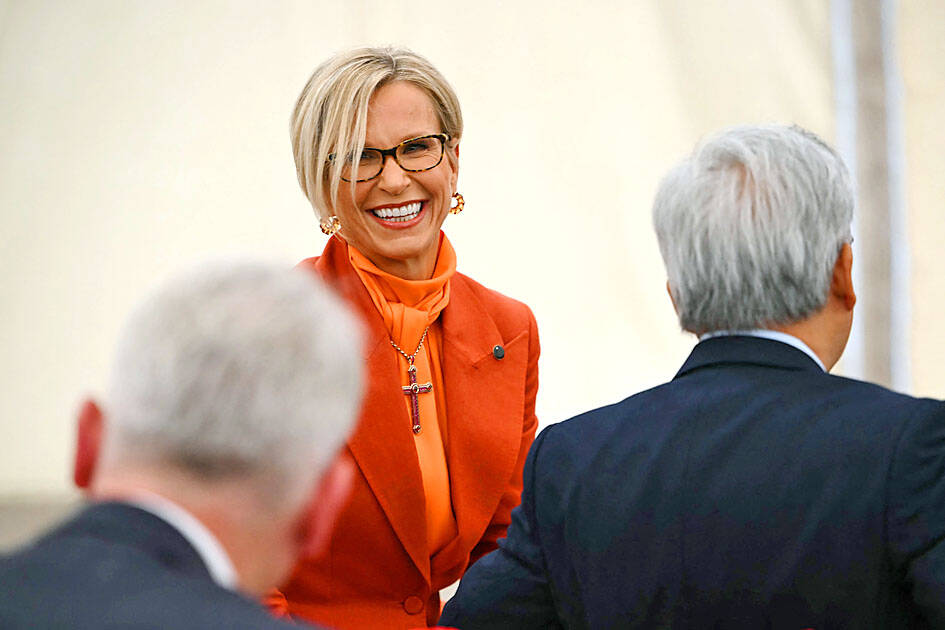GlaxoSmithKline PLC (GSK) chief executive officer (CEO) Emma Walmsley is stepping down after almost nine years in which she struggled to win investor backing and would be succeeded by the British drugmaker’s chief commercial officer.
Luke Miels, who previously worked at other major European drugmakers including AstraZeneca PLC, would take over on Jan. 1, GSK said in a statement yesterday.
The departure of Walmsley, 56, means one of the most prominent female CEOs in British business and in the global pharma industry is moving on.

Photo: AFP
Miels joined GSK in 2017 and currently has responsibility for the company’s global medicines and vaccines business.
The 50-year-old commercial chief has worked on growing the company’s drug portfolio, including in oncology, an area it has been seeking to rebuild.
In early London trading yesterday, GSK shares rose 3.5 percent.
As CEO, Walmsley has faced pressure from investors over the drugmaker’s pipeline of new medicines, with concern over whether the company has the right strategy to meet its ambitions of bringing in more than £40 billion (US$ 53.78 billion) in sales by 2031, up from just over £31 billion last year.
“It was very clear to me that now is the time because 2026 is a really important year to define the decade ahead,” Walmsley said in an interview.
The CEO said she and her team invested heavily in the pipeline and brought drugs such as HIV medicine Dovato and shingles vaccine Shingrix to market.
“I really do believe that now is the time and that’s why I made the decision I did,” she said.
Miels’ appointment came following a succession planning process where internal and external candidates were considered, GSK said in a statement. He has previously been cited as Walmsley’s potential successor.
Walmsley saw the company through the COVID-19 pandemic and has overseen the rollout of a vaccine for respiratory syncytial virus as well as the separation of GSK’s consumer business into a separate company called Haleon PLC.
Sales have increased significantly and investment into research and development has doubled. Still, investors have been disappointed by sputtering vaccine sales and a renewed push on cancer that has taken time to bear fruit.
Like other drugmakers, GSK is pushing to grow its presence in the US and has pledged to invest US$30 billion in the country over the next five years. The moves come as US President Donald Trump pushes ahead with his tariff plans and urges drugmakers to align prices more closely in the US and other markets.
GSK said Walmsley would stay with the company through September next year in order to help deal with geopolitical risks and smooth the leadership transition.
Walmsley said she expects to continue her career elsewhere, but would not be drawn on what industry that would be.
“I have every intention of doing another 15 years of exec work, but anyone that knows me will know I have not put one second into thinking about that. I am all in for GSK until the day I hand over that baton,” she said.

Shiina Ito has had fewer Chinese customers at her Tokyo jewelry shop since Beijing issued a travel warning in the wake of a diplomatic spat, but she said she was not concerned. A souring of Tokyo-Beijing relations this month, following remarks by Japanese Prime Minister Sanae Takaichi about Taiwan, has fueled concerns about the impact on the ritzy boutiques, noodle joints and hotels where holidaymakers spend their cash. However, businesses in Tokyo largely shrugged off any anxiety. “Since there are fewer Chinese customers, it’s become a bit easier for Japanese shoppers to visit, so our sales haven’t really dropped,” Ito

The number of Taiwanese working in the US rose to a record high of 137,000 last year, driven largely by Taiwan Semiconductor Manufacturing Co’s (TSMC, 台積電) rapid overseas expansion, according to government data released yesterday. A total of 666,000 Taiwanese nationals were employed abroad last year, an increase of 45,000 from 2023 and the highest level since the COVID-19 pandemic, data from the Directorate-General of Budget, Accounting and Statistics (DGBAS) showed. Overseas employment had steadily increased between 2009 and 2019, peaking at 739,000, before plunging to 319,000 in 2021 amid US-China trade tensions, global supply chain shifts, reshoring by Taiwanese companies and

Taiwan Semiconductor Manufacturing Co (TSMC, 台積電) received about NT$147 billion (US$4.71 billion) in subsidies from the US, Japanese, German and Chinese governments over the past two years for its global expansion. Financial data compiled by the world’s largest contract chipmaker showed the company secured NT$4.77 billion in subsidies from the governments in the third quarter, bringing the total for the first three quarters of the year to about NT$71.9 billion. Along with the NT$75.16 billion in financial aid TSMC received last year, the chipmaker obtained NT$147 billion in subsidies in almost two years, the data showed. The subsidies received by its subsidiaries —

Taiwan Semiconductor Manufacturing Co (TSMC) Chairman C.C. Wei (魏哲家) and the company’s former chairman, Mark Liu (劉德音), both received the Robert N. Noyce Award -- the semiconductor industry’s highest honor -- in San Jose, California, on Thursday (local time). Speaking at the award event, Liu, who retired last year, expressed gratitude to his wife, his dissertation advisor at the University of California, Berkeley, his supervisors at AT&T Bell Laboratories -- where he worked on optical fiber communication systems before joining TSMC, TSMC partners, and industry colleagues. Liu said that working alongside TSMC